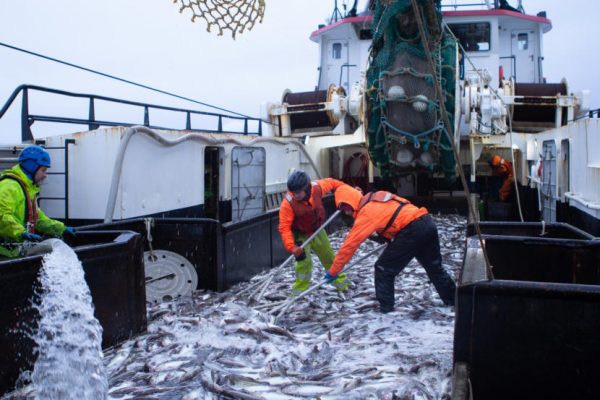
Some 600 business entities have filed plans with the state outlining how they’ll safely bring out-of-state workers into Alaska to support “critical infrastructure” amid the coronavirus pandemic, officials said Wednesday.
Starting Wednesday morning, Gov. Mike Dunleavy is requiring people arriving in Alaska from out of state to self-quarantine for two weeks to prevent the spread of COVID-19, the disease caused by the coronavirus. People who disobey the order can be fined up to $25,000 or imprisoned for a year.
Exemptions are possible, however, for businesses in what Dunleavy’s administration calls “critical infrastructure.” Those include the oil, logging and mining industries, health care, grocery stores, airlines and fishing.
Catch up on the latest coverage of coronavirus in Alaska
Businesses in those industries who have workers coming to Alaska before May were required to file pandemic plans with the state by Tuesday afternoon. The plans call for procedures for safely bringing in workers from out of state, and for protecting other employees and the surrounding community.
Dunleavy’s administration said that to the greatest extent possible, incoming workers should still self-quarantine once they get to Alaska. But in cases where that’s not possible, businesses were asked to explain why, and to outline their alternative to quarantining.
The deadline for businesses to submit the plans originally came less than 24 hours after Dunleavy announced the travel restrictions, which forced some of them to scramble.
“I was hearing from fishermen who were relaying through their processors that they’re out on the ocean right now fishing, and what are they supposed to do?” said Frances Leach, executive director of the United Fishermen of Alaska.
Leach said the state allowed different fishing industry associations, like the ones representing crabbers or cod harvesters, to submit general plans for their vessels and captains, which made the process easier.
She said members have had a hard time keeping up with the information and protocols they’re supposed to be following amid the pandemic. But they also recognize that these are unprecedented times, she added.
“You know, we’re all in this together. We’re all trying to quickly get up to speed,” Leach said. “And so far, I have found that most everybody has been really patient and understanding. And they get the severity of this.”
Jeremy Zidek, a spokesman for the state’s unified COVID-19 command, couldn’t give a timeline for how long it would take the state to review all of the businesses’ response plans. Leach said the state is allowing vessels that have turned in their action plans to continue their operations as if the plans have been approved.
Meanwhile, Alaska’s economic development agency is proposing a loan guarantee program of up to $100 million to support the state’s businesses as they fight for survival amid the coronavirus pandemic.
If approved by the Alaska Industrial Development and Export Authority board at an emergency meeting Friday, the program would work with banks, not directly with businesses. Businesses that have established borrowing relationships with banks would be able to add up to $1 million to their existing loans, and AIDEA would guarantee the extra amount.
The program would be called the Sustaining Alaska’s Future Economic Guarantee Program, or “AK SAFE,” and it would last as long as Gov. Mike Dunleavy’s coronavirus emergency proclamation. The initial proposal is to budget $50 million for the program, which could rise to $100 million if state lawmakers approve.
A spokesman for the authority, Karsten Rodvik, declined to share additional information about the proposal.
The pandemic of COVID-19 has devastated Alaska’s economy. The price of oil, the state’s major industry, has crashed amid lower demand and a standoff between some of the world’s major producers. Tourism is also facing a barren summer as people curtail their travel, and in-person service at restaurants and bars is closed indefinitely.
AIDEA’s agenda at its Friday meeting underscores that economic havoc. One item is a request by an oil company BlueCrest Energy, to delay principal payments on a $13.2 million state loan for a year due to the pandemic.
“The collapse in oil prices due to actions of foreign governments, exacerbated by the economic downturn from the COVID-19 pandemic, has resulted in the borrower encountering severe cash flow problems, and oil prices are not expected to recover in the immediate future,” the proposal says.
A second agenda item asks board members to add $2.5 million to an existing loan to the Blood Bank of Alaska. The request cites Dunleavy’s order that health care providers stop performing elective procedures for three months to free up capacity for COVID-19 patients.
“Elective procedures are approximately 50% of the blood bank’s revenues,” the authority’s staff wrote in a memo to board members.
Nathaniel Herz is an Anchorage-based journalist. He's been a reporter in Alaska for a decade, and is currently reporting for Alaska Public Media. Find more of his work by subscribing to his newsletter, Northern Journal, at natherz.substack.com. Reach him at natherz@gmail.com.




